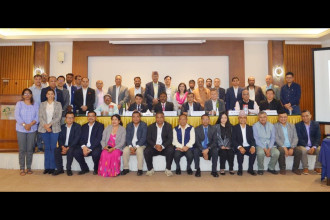
KATHMANDU: The Faculty of Management Studies at Pokhara University has announced a revamped curriculum for its BBA, BBA (Finance), and BBA (Travel and Tourism) programmes at the undergraduate level, as well as its MBA, MBA (Finance), and MBA (Global Business) programmes, starting from the Autumn Semester of 2024. The updated curriculum for the BHM and BCSIT programmes, which began in the Autumn of 2023, is already being taught and receiving positive feedback.
The primary objective of these updates is to equip students with the skills necessary to thrive in both the Nepali and global job markets, considering evolving global, social, economic, technological, and business environments. This ensures students are prepared for current and future challenges.
A key feature of the new curriculum is its emphasis on practice-oriented courses, including practicum, project work, consulting projects, and community engagement. The Industry Internship programme has been integrated into the final semester with no coursework required, allowing students to focus on their internships, which can enhance employability and transition smoothly into jobs.
The Bachelor's programmes consist of 120 credits over 48 months, with practical learning and a six-month internship. The BBA has evolved into a more comprehensive BBA in Finance with dual specialisation options in Banking, Insurance, Corporate Finance, and Capital Markets.
New courses have been introduced in the MBA programmes, providing options between industry and research tracks. Internships are prioritised in the final term, facilitating an easy transition to employment without returning for coursework.
Master's programmes offer flexible scheduling, allowing working students to pursue an MBA without compromising professional commitments. Pokhara University runs all its MBA programmes on a trimester system, with six trimesters over two years.
The university grants colleges high levels of flexibility and autonomy in designing and delivering courses. Colleges can design and evaluate a significant portion of the courses, adapting to market needs and focusing on practical, relevant learning. The university also allows credit transfers from other institutions up to 25%.
The new curriculum aims to align academic programmes with industry needs, cultivating skilled professionals and contributing to economic growth and national development.




-1745481452.jpeg)

